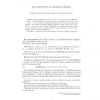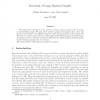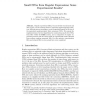210 search results - page 12 / 42 » Uniform regular enumerations |
ECCC
2010
13 years 7 months ago
2010
We give new pseudorandom generators for regular read-once branching programs of small width. A branching program is regular if the in-degree of every vertex in it is either 0 or 2...
EUROCOLT
1999
Springer
13 years 11 months ago
1999
Springer
Many settings of unsupervised learning can be viewed as quantization problems — the minimization of the expected quantization error subject to some restrictions. This allows the ...
ECCC
2008
13 years 7 months ago
2008
Higman essentially showed that if A is any language then SUBSEQ(A) is regular, where SUBSEQ(A) is the language of all subsequences of strings in A. Let s1, s2, s3, . . . be the sta...
RSA
2010
13 years 5 months ago
2010
We analyze the convergence of the spectrum of large random graphs to the spectrum of a limit infinite graph. We apply these results to graphs converging locally to trees and deri...
CORR
2010
Springer
13 years 7 months ago
2010
Springer
Regular expressions (REs), because of their succinctness and clear syntax, are the common choice to represent regular languages. However, efficient pattern matching or word recogni...



